发展自主学习能力,让学生快乐学习英语论文
描写自主学习的英文作文
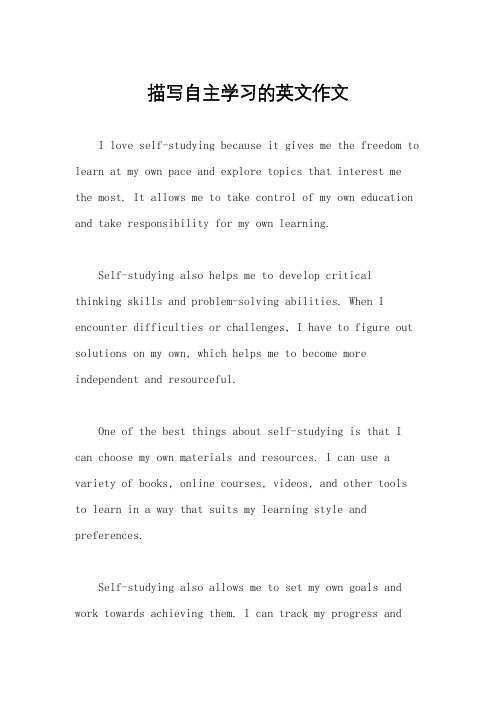
描写自主学习的英文作文I love self-studying because it gives me the freedom to learn at my own pace and explore topics that interest me the most. It allows me to take control of my own education and take responsibility for my own learning.Self-studying also helps me to develop criticalthinking skills and problem-solving abilities. When I encounter difficulties or challenges, I have to figure out solutions on my own, which helps me to become more independent and resourceful.One of the best things about self-studying is that I can choose my own materials and resources. I can use a variety of books, online courses, videos, and other tools to learn in a way that suits my learning style and preferences.Self-studying also allows me to set my own goals and work towards achieving them. I can track my progress andsee how much I've improved over time, which is really satisfying and motivating.Another benefit of self-studying is that it helps me to develop good time management skills. I have to plan my study schedule and allocate time for different subjects or topics, which teaches me to be disciplined and organized.Overall, self-studying has been a rewarding experience for me. It has helped me to become a more curious, motivated, and self-reliant learner, and I believe that these are valuable qualities that will benefit me in the long run.。
自主学习的英文作文
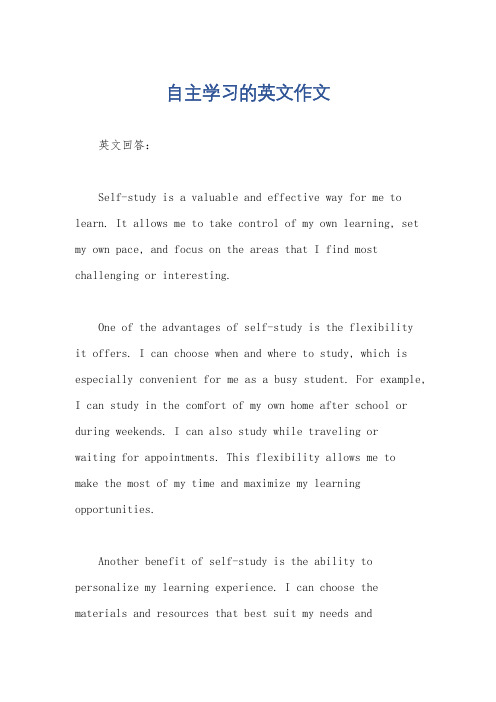
自主学习的英文作文英文回答:Self-study is a valuable and effective way for me to learn. It allows me to take control of my own learning, set my own pace, and focus on the areas that I find most challenging or interesting.One of the advantages of self-study is the flexibilityit offers. I can choose when and where to study, which is especially convenient for me as a busy student. For example, I can study in the comfort of my own home after school or during weekends. I can also study while traveling orwaiting for appointments. This flexibility allows me to make the most of my time and maximize my learning opportunities.Another benefit of self-study is the ability to personalize my learning experience. I can choose the materials and resources that best suit my needs andlearning style. For instance, I can select textbooks, online courses, or interactive apps that cater to my specific interests or goals. This personalization helps to keep me engaged and motivated, as I am able to explore topics that I am genuinely interested in.Self-study also encourages me to take responsibilityfor my own learning. I have to set goals, manage my time effectively, and stay disciplined. This sense of ownership and accountability helps me develop important skills such as self-motivation, time management, and perseverance. These skills are not only beneficial for my academic pursuits but also for my future career.Furthermore, self-study provides me with the opportunity to develop my critical thinking and problem-solving skills. Without a teacher guiding me through every step, I am forced to think independently and find solutions on my own. This helps me become a more resourceful and independent learner, which is essential in today's fast-paced and ever-changing world.中文回答:自主学习是我学习的一种宝贵而有效的方式。
自主学习能力英文作文
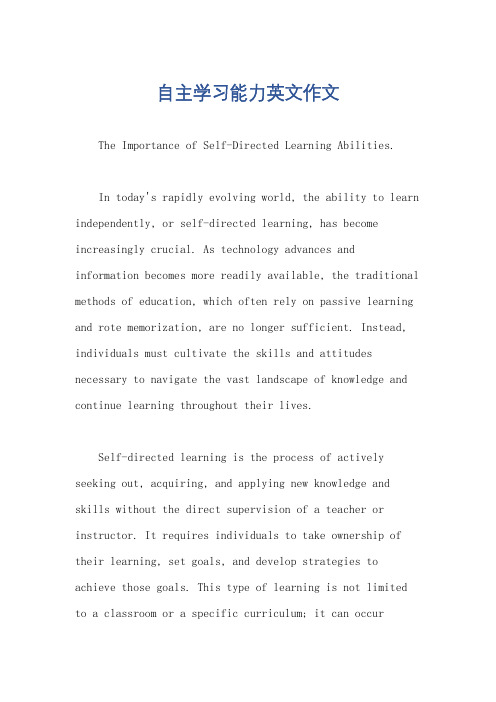
自主学习能力英文作文The Importance of Self-Directed Learning Abilities.In today's rapidly evolving world, the ability to learn independently, or self-directed learning, has become increasingly crucial. As technology advances and information becomes more readily available, the traditional methods of education, which often rely on passive learning and rote memorization, are no longer sufficient. Instead, individuals must cultivate the skills and attitudes necessary to navigate the vast landscape of knowledge and continue learning throughout their lives.Self-directed learning is the process of actively seeking out, acquiring, and applying new knowledge and skills without the direct supervision of a teacher or instructor. It requires individuals to take ownership of their learning, set goals, and develop strategies to achieve those goals. This type of learning is not limited to a classroom or a specific curriculum; it can occuranywhere, anytime, and often involves a blend oftraditional and non-traditional resources.One of the key benefits of self-directed learning isits flexibility. Unlike traditional classroom learning, which often adheres to a rigid schedule and curriculum,self-directed learning allows individuals to pursue their interests and passions at their own pace. This flexibility is especially valuable for those who have unique learning needs or schedules that don't align with traditional school hours.Moreover, self-directed learning fosters a sense of agency and empowerment. When individuals take control of their learning, they develop a stronger sense of self-confidence and a greater belief in their own capabilities. This empowerment can translate into other areas of life, encouraging individuals to take risks, pursue new opportunities, and contribute to their communities.However, self-directed learning is not without its challenges. One of the most.。
自主学习能力的英语作文
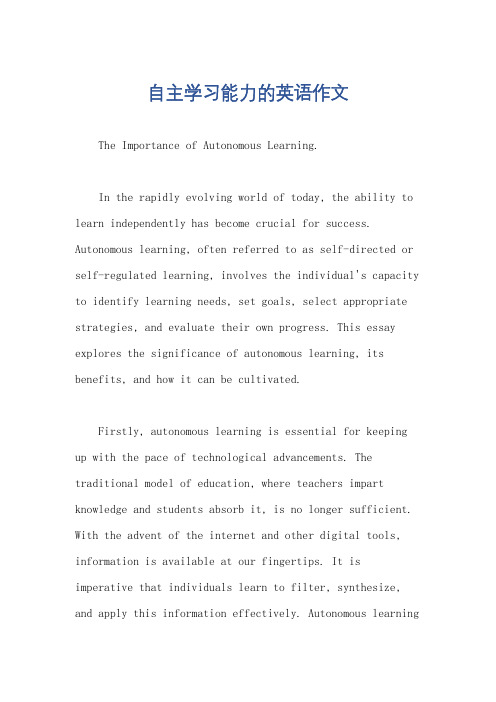
自主学习能力的英语作文The Importance of Autonomous Learning.In the rapidly evolving world of today, the ability to learn independently has become crucial for success. Autonomous learning, often referred to as self-directed or self-regulated learning, involves the individual's capacity to identify learning needs, set goals, select appropriate strategies, and evaluate their own progress. This essay explores the significance of autonomous learning, its benefits, and how it can be cultivated.Firstly, autonomous learning is essential for keeping up with the pace of technological advancements. The traditional model of education, where teachers impart knowledge and students absorb it, is no longer sufficient. With the advent of the internet and other digital tools, information is available at our fingertips. It is imperative that individuals learn to filter, synthesize, and apply this information effectively. Autonomous learningenables us to do so, as it encourages us to be proactive in seeking knowledge and skills.Moreover, autonomous learning fosters creativity and innovation. When students are given the freedom to explore topics that interest them, they are more likely to generate new ideas and solutions. This creative thinking is crucial for addressing the complex problems we face today. Autonomous learning also prepares individuals for lifelong learning, as it instills the habit of continuous improvement and adaptation.Additionally, autonomous learning enhances motivation and engagement. When students set their own learning goals and choose their own strategies, they are more invested in the learning process. This engagement leads to deeper understanding and retention of knowledge. Furthermore, the sense of accomplishment achieved through autonomous learningboosts self-confidence and motivation, further fueling the learning process.To cultivate autonomous learning, several strategiescan be employed. Firstly, teachers can adopt a student-centered approach, where they guide and facilitate learning instead of being the sole disseminators of knowledge. This approach encourages students to take ownership of their learning and make decisions about what to learn, how to learn, and when to learn.Secondly, providing opportunities for students to work on real-world problems can foster autonomous learning. When students are faced with challenges that require them to apply their knowledge and skills, they are more likely to engage in deep learning. Problem-solving and project-based learning are excellent examples of such opportunities.Moreover, fostering a positive learning environment is crucial for autonomous learning. This environment should be one that is safe, supportive, and encourages risk-taking and experimentation. When students feel valued and respected, they are more likely to take ownership of their learning and embrace challenges.In conclusion, autonomous learning is an essentialskill for success in today's world. It enables individuals to keep up with technological advancements, fosters creativity and innovation, and enhances motivation and engagement. To cultivate this skill, teachers and educators should adopt student-centered approaches, provide real-world problem-solving opportunities, and foster a positive learning environment. By doing so, we can equip students with the tools and skills they need to succeed in the future.。
自主学习重要性英语作文

自主学习重要性英语作文英文回答:Self-directed learning is becoming increasingly important in today's world. The ability to learn independently allows individuals to acquire new skills, knowledge, and expertise throughout their lives. This is essential for both personal and professional development.There are many benefits to self-directed learning. First, it allows individuals to learn at their own pace and in their own way. This can be especially beneficial for those who learn best by doing or who have busy schedules. Second, self-directed learning can help individuals develop critical thinking and problem-solving skills. By taking ownership of their learning, individuals must actively engage with the material and develop their own understanding. Third, self-directed learning can boostself-confidence and motivation. When individuals see that they are capable of learning new things on their own, itcan give them a sense of accomplishment and make them more likely to pursue further learning.There are many ways to engage in self-directed learning. Some popular methods include:Reading books and articles。
有关自主学习能力的英语作文
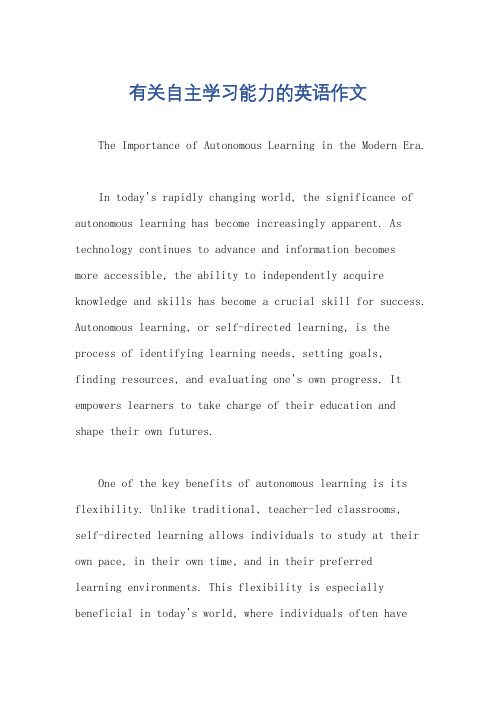
有关自主学习能力的英语作文The Importance of Autonomous Learning in the Modern Era.In today's rapidly changing world, the significance of autonomous learning has become increasingly apparent. As technology continues to advance and information becomesmore accessible, the ability to independently acquire knowledge and skills has become a crucial skill for success. Autonomous learning, or self-directed learning, is the process of identifying learning needs, setting goals,finding resources, and evaluating one's own progress. It empowers learners to take charge of their education and shape their own futures.One of the key benefits of autonomous learning is its flexibility. Unlike traditional, teacher-led classrooms,self-directed learning allows individuals to study at their own pace, in their own time, and in their preferredlearning environments. This flexibility is especially beneficial in today's world, where individuals often haveto juggle multiple responsibilities, such as work, family, and social commitments. With autonomous learning, learners can fit their studies into their schedules, making it easier to balance their responsibilities and still achieve their educational goals.Autonomous learning also fosters a sense of agency and ownership over one's learning. When learners are actively involved in the learning process, they are more likely to engage with the material, make connections betweendifferent ideas, and apply what they learn to real-world situations. This active engagement not only enhances learning outcomes but also fosters a sense of personal growth and accomplishment. As learners become more self-reliant in their learning, they gain a sense of confidence and autonomy that can translate into other areas of their lives.Moreover, autonomous learning prepares learners for the demands of the modern workforce. In today's knowledge-based economy, employers increasingly value individuals who can demonstrate a strong ability to learn independently andadapt to changing technologies and work environments. Autonomous learners are able to identify new skills and knowledge they need to succeed, seek out resources to acquire these skills, and apply them to solve real-world problems. This ability to learn independently and adapt quickly is crucial for career success.Additionally, autonomous learning fosters creativity and innovation. By encouraging learners to explore topics of interest and to think critically about the information they encounter, self-directed learning nurtures a culture of curiosity and exploration. This culture, in turn,fosters creativity and innovation, as learners are more likely to generate new ideas and solutions when they are actively engaged in the learning process.However, while the benefits of autonomous learning are numerous, it is not without its challenges. One of the main challenges is the need for strong self-discipline and motivation. Without a teacher or external structure guiding them, learners must have the self-drive to stay focused and committed to their learning goals. Additionally, findingreliable and accurate resources can be a challenge, especially in the vast and often overwhelming online world of information.To overcome these challenges, learners can employ a variety of strategies. They can set clear and achievable learning goals, create structured learning plans, and use a variety of learning tools and resources to support their learning. They can also seek out mentors or peer learning groups to provide feedback and encouragement. By actively engaging in the learning process and taking ownership of their education, learners can harness the power of autonomous learning and achieve their educational and career goals.In conclusion, autonomous learning is a crucial skill for success in today's world. It empowers learners to take charge of their education, fit learning into their own schedules, and engage actively with the material. Itfosters a sense of agency, ownership, creativity, and innovation, and prepares learners for the demands of the modern workforce. While it may present challenges, with theright strategies and support, learners can harness the power of autonomous learning and shape their own futures.。
如何培养自主学习能力的英语作文

如何培养自主学习能力的英语作文全文共6篇示例,供读者参考篇1Sure! here is the English essay written in a primary school student's tone:How to Develop Independent Learning SkillsHey everyone! Today, I want to talk about how we can become super-duper good at learning all by ourselves. It's all about being independent learners! So, let's jump right into it.Firstly, we need to be organized. That means having a special spot to study, like a cool desk or a cozy corner with all our study materials. We should keep everything we need, like books, notebooks, and pencils, in that spot so we don't waste time looking for them.Next, we should set goals for ourselves. We can write down what we want to achieve each day or week and give ourselves a high-five when we reach those goals. It feels awesome to check off those tasks on our to-do list!Another thing we can do is ask questions. If we don't understand something, it's totally okay to raise our hand and ask our teachers or classmates for help. We can also look up information online or in books to get more knowledge.It's also super important to practice, practice, practice! We can review our notes, do extra exercises, or even teach someone else what we've learned. The more we practice, the better we'll get at the subject.Lastly, we should stay positive and believe in ourselves. Learning can be tough sometimes, but we should never give up. We're all amazing learners, and with hard work and determination, we can achieve anything!So, let's all work on being independent learners and show the world just how awesome we are! Let's go, Team Independent Learning!篇2How to Develop Self-learning AbilitiesHi guys! Today I want to share with you some tips on how to develop self-learning abilities. Self-learning means you can learn things on your own without someone telling you what to do. It'sreally cool because you can learn anything you want anytime and anywhere!First of all, you need to set goals for yourself. Think about what you want to learn and why. Maybe you want to improve your English skills, learn how to play a musical instrument, or understand more about the world. Setting goals will help you stay focused and motivated.Next, create a study schedule. Make a plan of what you want to learn each day or week. It's important to be consistent and dedicate some time each day for self-learning. You can choose to study in the morning, afternoon, or evening, whichever works best for you.Now, find resources to help you learn. You can use books, online courses, educational videos, or even ask a teacher or friend for help. Make sure to choose resources that are interesting and easy for you to understand.Don't forget to practice what you've learned. The more you practice, the better you'll become. For example, if you're learning a new language, try speaking with someone who knows that language. If you're learning a new skill, keep practicing until you get better at it.Lastly, be curious and ask questions. Don't be afraid to explore new things and seek answers to your questions. Remember, self-learning is all about taking charge of your own learning process and enjoying the journey.So there you have it, guys! Follow these tips and you'll be on your way to developing awesome self-learning abilities. Have fun learning and exploring new things!篇3Title: How to Develop Independent Learning SkillsHey guys! Today I want to share with you some tips on how to become a super-duper independent learner. It's really important to be able to study on your own, so let's get started!Firstly, you need to be organized. Make a study schedule and stick to it. Plan out when you're going to study each subject and make sure you have all the materials you need.Next, set goals for yourself. Decide what you want to achieve in your studies and work towards those goals. Whether it's getting a good grade on a test or mastering a new skill, having goals will motivate you to keep learning.Don't be afraid to ask for help if you need it. If you're stuck on a problem or don't understand something, ask your teacher or a classmate for help. It's okay to not know everything, and asking for help is a great way to learn.Use different study techniques to keep things interesting. Try making flashcards, watching educational videos, or writing summaries of what you've learned. Mixing things up will help you stay engaged and retain information better.Finally, practice, practice, practice! The more you practice, the more skills you'll develop and the better you'll get at learning independently.So there you have it, some tips on how to develop your independent learning skills. Remember, learning is a journey and it's important to enjoy the process. Keep working hard and you'll be a super independent learner in no time!篇4Title: How to Develop Independent Learning SkillsHi everyone! Today I want to talk about how we can become better at learning all by ourselves. It's called independentlearning skills, and it's super important because it helps us become better students. Are you ready? Let's go!First, we need to set goals for ourselves. It's like having a roadmap for our learning journey. We can write down what we want to achieve and how we plan to get there. For example, if we want to improve our English skills, we can set a goal to read one English storybook every week.Next, we should be curious and ask questions. Don't be afraid to wonder and explore. If we don't understand something, we can ask our teachers, parents, or even look it up online. Remember, there's no such thing as a silly question!Another tip is to organize our study materials. Keep our notebooks, textbooks, and other resources neat and tidy. This way, we can find what we need easily when we study. It's also a good idea to create a study schedule and stick to it. This helps us stay on track and not procrastinate.Lastly, don't forget to review what we've learned. This helps us remember and understand better. We can test ourselves with quizzes, flashcards, or even teach what we've learned to someone else. Sharing knowledge is a great way to reinforce what we know.So there you have it, my friends. Developing independent learning skills is all about setting goals, being curious, staying organized, and reviewing what we've learned. With practice and determination, we can become awesome at learning on our own. Let's go out there and rock our learning journey!篇5Title: How to Develop Self-learning SkillsHey guys, do you want to become a super learner and rock at school? Well, then you gotta work on your self-learning skills! Self-learning means you can learn stuff by yourself, without always depending on your teacher or parents. Here are some tips on how to do it:Firstly, set goals for yourself. Decide what you want to achieve and make a plan on how to get there. For example, if you want to improve your English, set a goal to read one English book per month or watch English movies every week.Secondly, be curious and ask questions. Don't be afraid to explore new topics and ask why things work the way they do. The more questions you ask, the more you will learn.Thirdly, stay organized. Keep a study schedule, write down deadlines and important dates, and make sure to review your notes regularly. This will help you stay on track and not fall behind.Fourthly, practice, practice, practice! The more you practice, the better you will get at something. Whether it's math problems, writing essays, or learning new words in English, keep practicing until you become a pro.Lastly, don't be afraid to make mistakes. Mistakes are part of the learning process, so don't get discouraged if you get something wrong. Learn from your mistakes and move on.So, are you ready to become a self-learning champ? Follow these tips and watch yourself soar to success! Remember, the more you learn, the more you grow. Happy learning, everyone!篇6Hey guys! Do you want to know how to become better at learning on your own? Well, I’m here to tell you some tips on how to improve your self-learning skills!First of all, you need to stay organized. Keep all your school stuff in one place so you don’t waste time looking for things.Make a schedule and plan out your study time so you can make the most out of it.Secondly, be curious and ask questions. Don’t be afraid t o ask your teachers or friends if you don’t understand something. Look up information online or in books if you want to know more about a topic. It’s important to be curious and eager to learn new things.Next, practice, practice, practice! The more you practice something, the better you will get at it. If you’re struggling with a math problem or a difficult English grammar rule, keep practicing until you get it right. Don’t give up easily!Also, try to find different ways to learn. Watch educational videos, listen to podcasts, or join study groups with your friends. Everyone learns in different ways, so it’s important to find what works best for you.Lastly, stay motivated and don’t get discouraged. Learning on your own can be challenging, but r emember that you’re capable of achieving great things if you put your mind to it. Stay positive and keep pushing yourself to do better.I hope these tips help you become better at self-learning. Remember, you’re never too young to start developing your skills and becoming a better learner. Good luck, guys!。
自主学习的英语作文
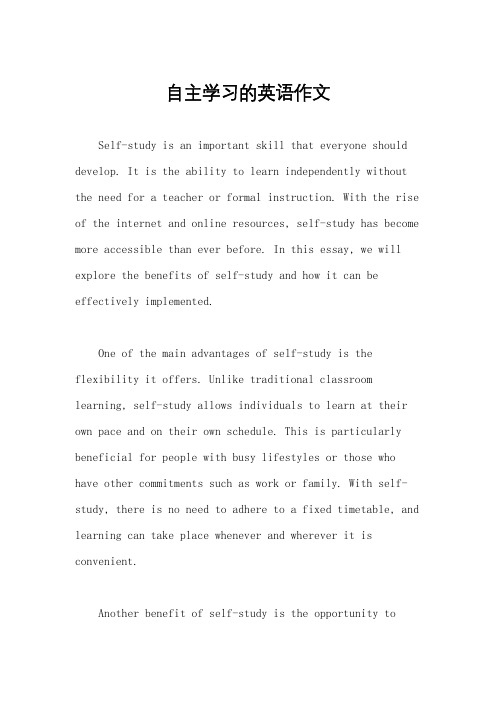
自主学习的英语作文Self-study is an important skill that everyone should develop. It is the ability to learn independently without the need for a teacher or formal instruction. With the rise of the internet and online resources, self-study has become more accessible than ever before. In this essay, we will explore the benefits of self-study and how it can be effectively implemented.One of the main advantages of self-study is the flexibility it offers. Unlike traditional classroom learning, self-study allows individuals to learn at their own pace and on their own schedule. This is particularly beneficial for people with busy lifestyles or those who have other commitments such as work or family. With self-study, there is no need to adhere to a fixed timetable, and learning can take place whenever and wherever it is convenient.Another benefit of self-study is the opportunity totailor the learning experience to suit individual needs and interests. When studying independently, individuals have the freedom to choose the topics they want to focus on and the resources they want to use. This can lead to a more personalized and engaging learning experience, as individuals are more likely to be motivated and interested in the material they are studying.In addition, self-study can help individuals develop important skills such as self-discipline and self-motivation. Without the external structure and guidance provided by a teacher, self-learners must takeresponsibility for their own learning and stay motivated to achieve their goals. This can help build resilience and a strong work ethic, which are valuable attributes in both academic and professional settings.To effectively implement self-study, it is important to have a clear plan and set realistic goals. This can involve creating a study schedule, identifying resources and materials, and setting specific targets for what you want to achieve. It is also important to stay organized anddisciplined, as self-study requires a high level of self-motivation and commitment.In conclusion, self-study is a valuable skill that can offer numerous benefits. It provides flexibility, allowsfor personalized learning experiences, and helps develop important skills such as self-discipline and motivation. By effectively implementing self-study, individuals can take control of their own learning and achieve their academic and personal goals.。
有关自主学习英语的论文范文_初中万能英语作文3篇

有关自主学习英语的论文范文_初中万能英语作文3篇关于”有关自主学习“的英语作文模板3篇,作文题目:About autonomous learning。
以下是关于有关自主学习的初中英语模板,每篇作文均为万能模板带翻译。
高分英语作文1:About autonomous learningHow does life begin on earth? The order of life's development is Newton, Einstein, Hawking, Copernicus, the revolutionary theory tells me, I will forget, I will remember,let me learn with me, share friendship, learn king, use language, task, project,.中文翻译:生命是如何在地球上开始的生命发展的顺序是牛顿,爱因斯坦,霍金哥白尼理论告诉我,我会忘记,我会记住,让我和我一起学习,分享友谊,国王学习,使用语言,任务,项目。
万能作文模板2:关于自主学习How does life begin on earth? The order of life's development is Newton, Einstein, Hawking, Copernicus, the revolutionary theory tells me, I will forget, I will remember,let me learn with me, share friendship, learn king, use language, task, project,.中文翻译:生命是如何在地球上开始的生命发展的顺序是牛顿,爱因斯坦,霍金哥白尼理论告诉我,我会忘记,我会记住,让我和我一起学习,分享友谊,国王学习,使用语言,任务,项目。
有关自主学习的英文作文
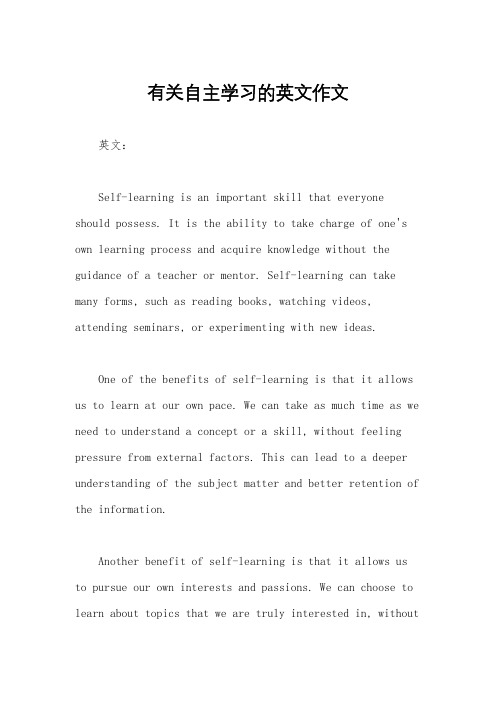
有关自主学习的英文作文英文:Self-learning is an important skill that everyone should possess. It is the ability to take charge of one's own learning process and acquire knowledge without the guidance of a teacher or mentor. Self-learning can take many forms, such as reading books, watching videos, attending seminars, or experimenting with new ideas.One of the benefits of self-learning is that it allows us to learn at our own pace. We can take as much time as we need to understand a concept or a skill, without feeling pressure from external factors. This can lead to a deeper understanding of the subject matter and better retention of the information.Another benefit of self-learning is that it allows us to pursue our own interests and passions. We can choose to learn about topics that we are truly interested in, withoutbeing limited by a curriculum or syllabus. This can lead to a greater sense of fulfillment and satisfaction in our learning journey.However, self-learning also requires a great deal of discipline and motivation. Without the structure and accountability provided by a teacher or mentor, it can be easy to lose focus or become distracted. It is important to set goals, create a schedule, and hold oneself accountable for making progress towards those goals.Overall, self-learning is a valuable skill that can lead to personal growth and development. It allows us to take control of our own learning journey and pursue our passions and interests.中文:自主学习是一项每个人都应该具备的重要技能。
自主学习能力的重要性英文作文
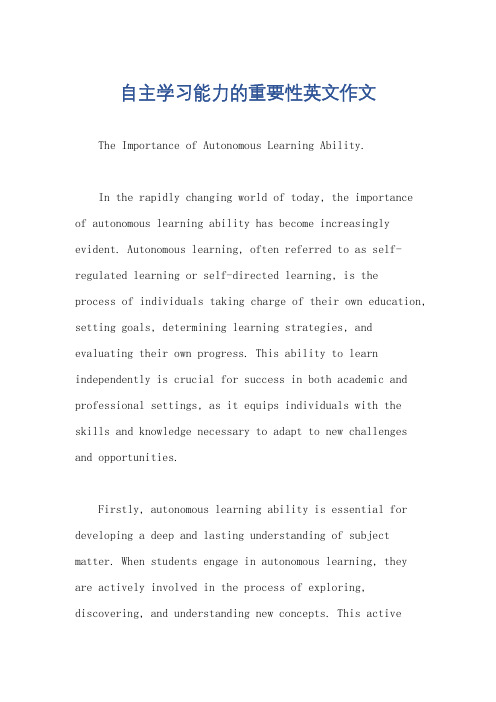
自主学习能力的重要性英文作文The Importance of Autonomous Learning Ability.In the rapidly changing world of today, the importanceof autonomous learning ability has become increasingly evident. Autonomous learning, often referred to as self-regulated learning or self-directed learning, is theprocess of individuals taking charge of their own education, setting goals, determining learning strategies, and evaluating their own progress. This ability to learn independently is crucial for success in both academic and professional settings, as it equips individuals with the skills and knowledge necessary to adapt to new challenges and opportunities.Firstly, autonomous learning ability is essential for developing a deep and lasting understanding of subject matter. When students engage in autonomous learning, they are actively involved in the process of exploring, discovering, and understanding new concepts. This activelearning approach is far more effective than simplyreceiving information passively. By delving into topics of interest and pursuing their own lines of inquiry, students are able to build a robust and interconnected knowledgebase that they can draw upon throughout their lives.Secondly, autonomous learning ability is crucial for cultivating critical thinking and problem-solving skills.In an autonomous learning environment, students are encouraged to question assumptions, analyze evidence, and draw their own conclusions. This process of criticalanalysis and synthesis not only enhances theirunderstanding of subject matter, but also helps them to develop the ability to think critically and solve problems independently. These skills are invaluable in today's world, where the ability to adapt to new situations and find innovative solutions to problems is paramount.Thirdly, autonomous learning ability is important for fostering a sense of personal agency and responsibility. When students take charge of their own learning, they are able to identify their own strengths and weaknesses, setrealistic goals, and track their progress. This sense of agency and responsibility not only helps them to stay motivated and engaged in the learning process, but also prepares them for the real world, where they will be expected to take charge of their own careers and personal development.Fourthly, autonomous learning ability is essential for staying up-to-date in a rapidly changing world. In today's era of information overload, the ability to filter, evaluate, and apply new information is crucial. Autonomous learners are constantly seeking out new resources and opportunities for learning, and are able to adapt their learning strategies to meet the demands of a constantly evolving landscape. This ability to stay agile and responsive to change is essential for success in today's rapidly changing world.Finally, autonomous learning ability is important for fostering a culture of lifelong learning. As technology and society continue to evolve, the need for lifelong learning has become increasingly apparent. Autonomous learners arenot content to rest on their laurels; they are constantly seeking out new opportunities for growth and development. This commitment to lifelong learning not only helps individuals to stay competitive in their fields, but also enriches their lives with new experiences and perspectives.In conclusion, the importance of autonomous learning ability cannot be overstated. It is a crucial skill for success in both academic and professional settings, and it has the potential to transform individuals into lifelong learners who are constantly seeking out new opportunities for growth and development. As we move into the future, it is essential that we cultivate and nurture this ability within ourselves and our students, in order to prepare them for the challenges and opportunities that lie ahead.。
写自主学习的英语作文
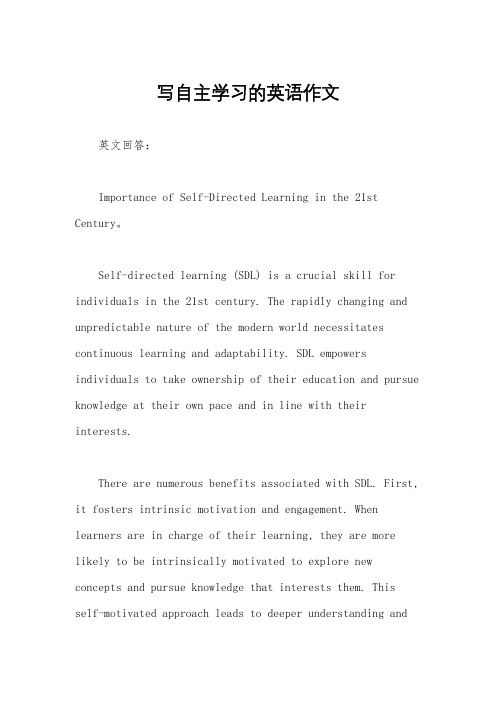
写自主学习的英语作文英文回答:Importance of Self-Directed Learning in the 21st Century。
Self-directed learning (SDL) is a crucial skill for individuals in the 21st century. The rapidly changing and unpredictable nature of the modern world necessitates continuous learning and adaptability. SDL empowers individuals to take ownership of their education and pursue knowledge at their own pace and in line with their interests.There are numerous benefits associated with SDL. First, it fosters intrinsic motivation and engagement. When learners are in charge of their learning, they are more likely to be intrinsically motivated to explore new concepts and pursue knowledge that interests them. Thisself-motivated approach leads to deeper understanding andretention of information.Second, SDL promotes critical thinking and problem-solving skills. Individuals who engage in SDL take an active role in their learning process. They need toidentify their learning needs, set goals, and develop strategies for achieving those goals. This process enhances critical thinking skills, analytical abilities, and the capacity to solve problems independently.Third, SDL cultivates lifelong learning. In the modern world, knowledge is constantly evolving, and individuals need to be equipped to adapt and learn throughout their lives. SDL fosters a mindset of continuous learning and encourages individuals to seek new knowledge and skills beyond formal education settings.中文回答:自主学习在21世纪的重要性。
描写自主学习的英文作文
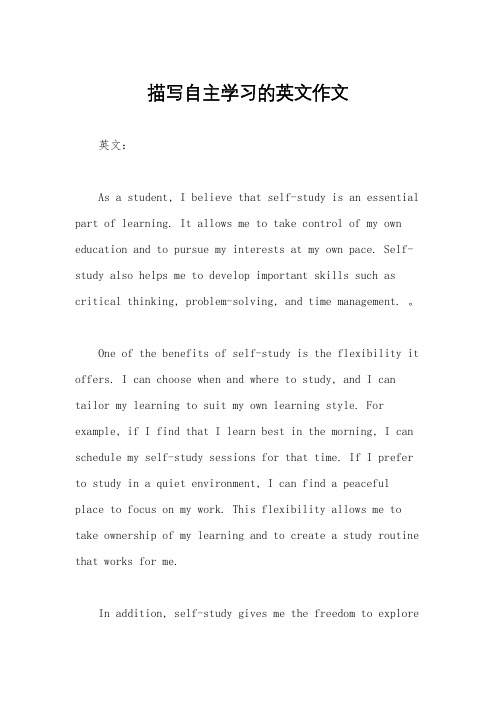
描写自主学习的英文作文英文:As a student, I believe that self-study is an essential part of learning. It allows me to take control of my own education and to pursue my interests at my own pace. Self-study also helps me to develop important skills such as critical thinking, problem-solving, and time management. 。
One of the benefits of self-study is the flexibility it offers. I can choose when and where to study, and I can tailor my learning to suit my own learning style. For example, if I find that I learn best in the morning, I can schedule my self-study sessions for that time. If I prefer to study in a quiet environment, I can find a peaceful place to focus on my work. This flexibility allows me to take ownership of my learning and to create a study routine that works for me.In addition, self-study gives me the freedom to exploretopics that interest me outside of the traditional curriculum. For example, I have always been fascinated by astronomy, so I have been able to use self-study to learn more about the stars and planets. This has allowed me to deepen my understanding of a subject that I am passionate about, and it has enriched my overall learning experience.Furthermore, self-study has taught me valuable skills that will benefit me in the future. For example, I have learned how to set goals for my learning, how to stay motivated, and how to manage my time effectively. These skills will be useful not only in my academic pursuits but also in my future career.Overall, self-study has been a rewarding and empowering experience for me. It has allowed me to take charge of my own learning and to pursue my interests in a way that is meaningful to me. I believe that self-study is an important complement to traditional classroom learning, and I will continue to embrace it as a valuable part of my education.中文:作为一名学生,我相信自主学习是学习的重要组成部分。
高中英语作文提高学生的自主学习能力
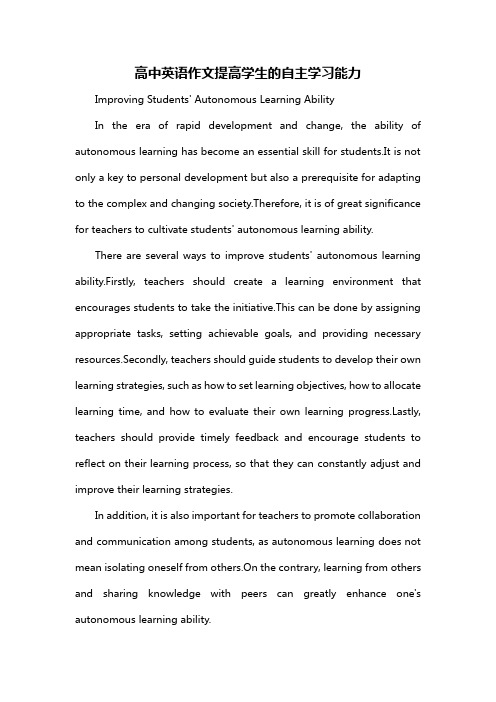
高中英语作文提高学生的自主学习能力Improving Students' Autonomous Learning AbilityIn the era of rapid development and change, the ability of autonomous learning has become an essential skill for students.It is not only a key to personal development but also a prerequisite for adapting to the complex and changing society.Therefore, it is of great significance for teachers to cultivate students' autonomous learning ability.There are several ways to improve students' autonomous learning ability.Firstly, teachers should create a learning environment that encourages students to take the initiative.This can be done by assigning appropriate tasks, setting achievable goals, and providing necessary resources.Secondly, teachers should guide students to develop their own learning strategies, such as how to set learning objectives, how to allocate learning time, and how to evaluate their own learning stly, teachers should provide timely feedback and encourage students to reflect on their learning process, so that they can constantly adjust and improve their learning strategies.In addition, it is also important for teachers to promote collaboration and communication among students, as autonomous learning does not mean isolating oneself from others.On the contrary, learning from others and sharing knowledge with peers can greatly enhance one's autonomous learning ability.In conclusion, improving students' autonomous learning ability is not only beneficial for their academic performance but also essential for their personal and social development.As teachers, we should take the initiative to cultivate this ability, and create a conducive learning environment that encourages students to take charge of their own learning.Only in this way can we truly empower our students for the future.。
如何自主学习及其好处 英语作文

如何自主学习及其好处英语作文Self-learning is a valuable skill that can be applied to any subject, including English. There are several ways to approach self-learning, and the benefits of doing so are numerous.Firstly, one of the key ways to self-learn English is through reading. Reading a variety of materials, such as books, articles, and even social media posts, can expose learners to different styles of writing and vocabulary. This can help improve comprehension and expand one's own vocabulary. Additionally, listening to English audio materials, such as podcasts or audiobooks, can also aid in language learning.Another important aspect of self-learning English is writing. Keeping a journal, writing short stories, or even practicing writing essays can help reinforce grammar and sentence structure. Writing also allows learners to practice expressing their thoughts and ideas in English.Additionally, utilizing online resources and language learning apps can be beneficial. There are countlesswebsites and apps that offer English language lessons, grammar exercises, and vocabulary quizzes. These resources can provide structure and guidance for self-learners.The benefits of self-learning English are vast. Firstly, it allows individuals to learn at their own pace and tailor their learning experience to their specific needs and interests. This can lead to a more personalized and enjoyable learning journey. Additionally, self-learning promotes independence and self-discipline, as learners must take initiative and hold themselves accountable for their progress. This can be a valuable skill that extends beyond language learning and into other areas of life.Self-learning can also be a cost-effective alternativeto traditional classroom learning. Many resources for self-learning English are available for free or at a lower cost than formal language courses. This makes language learning more accessible to a wider range of individuals.Finally, self-learning English can lead to a sense of accomplishment and confidence. As learners see their progress and improvement over time, they may feel moreconfident in their language abilities and more motivated to continue learning.自主学习是一种有价值的技能,可以应用于任何学科,包括英语。
自主学习重要性作文英语
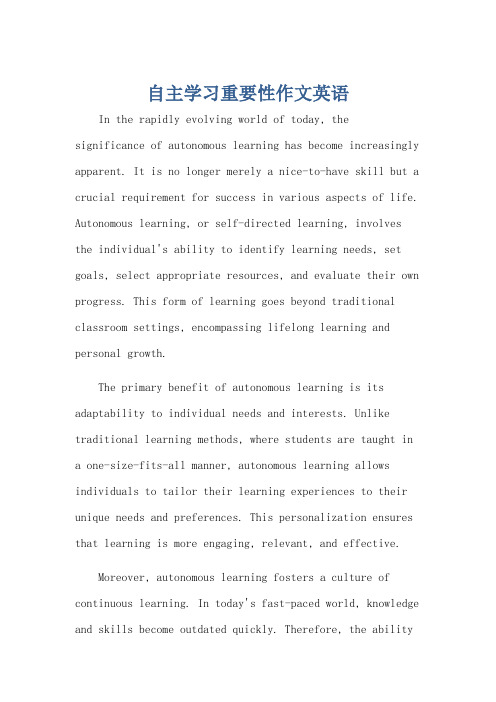
自主学习重要性作文英语In the rapidly evolving world of today, thesignificance of autonomous learning has become increasingly apparent. It is no longer merely a nice-to-have skill but a crucial requirement for success in various aspects of life. Autonomous learning, or self-directed learning, involves the individual's ability to identify learning needs, set goals, select appropriate resources, and evaluate their own progress. This form of learning goes beyond traditional classroom settings, encompassing lifelong learning and personal growth.The primary benefit of autonomous learning is its adaptability to individual needs and interests. Unlike traditional learning methods, where students are taught in a one-size-fits-all manner, autonomous learning allows individuals to tailor their learning experiences to their unique needs and preferences. This personalization ensures that learning is more engaging, relevant, and effective.Moreover, autonomous learning fosters a culture of continuous learning. In today's fast-paced world, knowledge and skills become outdated quickly. Therefore, the abilityto independently update one's knowledge and skills is crucial for staying competitive. Autonomous learning equips individuals with the tools and strategies to keep pace with changing trends and technologies.Additionally, autonomous learning enhances problem-solving abilities. As individuals explore and learn independently, they encounter various challenges and problems. These experiences help them develop critical thinking skills and a problem-solving mindset, enabling them to handle complex issues effectively.Furthermore, autonomous learning promotes lifelong learning. It encourages individuals to seek new knowledge and skills throughout their lives, not just during their formal education. This lifelong quest for learning helps individuals stay engaged and fulfilled, enabling them to adapt to changing environments and challenges.However, while the benefits of autonomous learning are numerous, it is not always easy to implement. It requires discipline, motivation, and good time management skills. It also involves trial and error as learners explore new areas of knowledge and figure out effective learning strategies.Despite these challenges, the payoffs are worth it. Autonomous learning not only leads to better academic and career outcomes but also enhances personal growth and development.In conclusion, autonomous learning is an essentialskill for success in today's world. It empowers individuals to take charge of their learning, adapt to changing environments, and achieve their goals. By fostering a culture of continuous learning and promoting critical thinking and problem-solving abilities, autonomous learning sets individuals on a path of lifelong learning and personal growth.**自主学习的重要性**在当今快速发展的世界中,自主学习的重要性日益显现。
自主学习的好处及如何做英语作文

自主学习的好处及如何做英语作文Certainly, I'll be happy to provide my perspective on the benefits of self-directed learning and how to approach writing an English essay.The advantages of self-directed learning are numerous and profound. When individuals take the initiative to guide their own educational journey, they cultivate a deeper sense of ownership and investment in the learning process. This autonomy fosters greater motivation, as learners are able to align the content and pace of their studies with their personal interests and needs. As a result, the information and skills acquired tend to be more meaningful and lasting.Furthermore, self-directed learning encourages the development of critical thinking and problem-solving abilities. Rather than passively receiving information, learners are required to actively research, analyze, and synthesize knowledge from various sources. This mental exercise strengthens their capacity to think critically,identify knowledge gaps, and devise creative solutions. These skills are invaluable not only in academic pursuits, but also in the professional realm and in navigating the complexities of life.Another key benefit of self-directed learning is the enhancement of time management and self-discipline. Learners must take responsibility for organizing their schedules, prioritizing their tasks, and maintaining momentum in the absence of external supervision. This fosters a sense of personal accountability and the ability to manage one's time effectively – skills that are highly sought after in the workplace and in personal endeavors.Additionally, self-directed learning allows individuals to tailor their educational experiences to their unique learning styles and preferences. Some may thrive in a more structured, linear approach, while others may benefit from a more exploratory, nonlinear method. By taking charge of their learning, individuals can experiment with different strategies and find the approaches that resonate most with them, further enhancing the effectiveness and enjoyment ofthe learning process.When it comes to writing an English essay, the principlesof self-directed learning can be applied to great advantage. The first step is to develop a clear understanding of the essay prompt or assignment. Carefully analyzing the requirements, identifying the key points to be addressed, and brainstorming potential ideas are crucial in crafting a well-structured and coherent essay.Next, learners should engage in extensive research togather relevant information and supporting evidence. This may involve consulting a variety of sources, such as academic journals, reliable online resources, and personal experiences. The ability to critically evaluate the credibility and relevance of these sources is essential in building a strong argumentative foundation.As the writing process begins, learners should focus on organizing their thoughts in a logical and coherent manner. This may involve outlining the essay's structure, creatinga clear thesis statement, and developing well-reasonedparagraphs that flow seamlessly from one to the next. Attention to language usage, grammar, and mechanics is also important to ensure the essay is presented in a polishedand professional manner.Throughout the writing process, self-directed learners should be willing to critically evaluate their work,identify areas for improvement, and make revisions accordingly. This iterative approach not only enhances the quality of the final essay but also reinforces thelearner's ability to self-assess and continuously improve their writing skills.In conclusion, the benefits of self-directed learning are numerous and profound. By taking an active role in their educational journey, individuals can cultivate a deeper sense of ownership, develop critical thinking and problem-solving skills, improve time management and self-discipline, and tailor their learning experiences to their unique needs and preferences. These skills are invaluable in the context of writing an English essay, as they empower learners to thoroughly understand the assignment, conduct rigorousresearch, organize their thoughts effectively, and continuously refine their work. Embracing the principles of self-directed learning can lead to a more rewarding and transformative educational experience for English essay writing and beyond.。
发展自主学习能力,让学生快乐学习(英语论文)

发展自主学习能力,让学生快乐学习———一堂英语Project课的教学启示【摘要】根据人类知识习得的规律,只有知识接受方在学习过程中能有所实践和体验,知识及技能才能被真正习得。
同样,在英语教育教学过程中,要分析被教育对象的不同特点,重视学生个性的发展,把英语教学过程转变成学生能参与、实践、体验、交流和展现的舞台,帮助他们创造成就感,才能让他们“快乐”地学习。
在这样的教学过程中,教师虽不是舞台的主角,但却发挥着更为重要的作用。
他需要及时观察和洞悉学生在学习过程中暴露的问题和困惑,适时地去引导和教育学生,实现教育做人和教学知识的实效性。
【关键词】体验学习;自主学习;研究性学习成果展示一、引言可能有同行在探讨教学工作的时候,谈到的最大困惑要数“教育主体学生缺乏对学习英语的兴趣,从而对待学习不够主动”这个问题了。
仔细思考之后,发现原因还是出在我们一贯的传统教学方法上。
“满堂灌”的教学方式不仅磨灭了学生对教学内容主动接受的兴趣,而且还忽视了对学生个性发展的培养。
另外,缺乏主动参与,没有体验和探究的学习过程也不会给学生带来真正意义上的知识习得。
正如法国大教育家卢梭提倡的教育应当“归于自然”,我们必须要重视教育对象的成长和发育过程,而且还必须要注重他们习得知识的自然过程。
所以,只有将一些教学内容设计成为体验性的学习活动,鼓励全体学生在整个教学活动中去体验、实践、参与、合作与交流,才能帮助他们获得语言的习得,实现语言综合运用能力的提高。
学习过程中和谐的人际交往,学生自己的主动探究性学习以及学习成果展示时得到的老师的肯定和评价,都会有助于学生自觉形成自主学习的能力,并且真正做到快乐学习。
那么,如何将教学内容设计成为一个体验性的学习活动?如何激发学生的兴趣,做到真正乐于学习?我们又将如何帮助学生将良好的乐学状态保持和延续下去呢?下面就以具体一堂课的设计准备、课堂实录、课后拓展等实践工作为依据,谈谈如何在日常教学过程中培养学生自主学习能力,发展学生不同个性,从而让学生快乐学习。
- 1、下载文档前请自行甄别文档内容的完整性,平台不提供额外的编辑、内容补充、找答案等附加服务。
- 2、"仅部分预览"的文档,不可在线预览部分如存在完整性等问题,可反馈申请退款(可完整预览的文档不适用该条件!)。
- 3、如文档侵犯您的权益,请联系客服反馈,我们会尽快为您处理(人工客服工作时间:9:00-18:30)。
发展自主学习能力,让学生快乐学习———一堂英语Project课的教学启示【摘要】根据人类知识习得的规律,只有知识接受方在学习过程中能有所实践和体验,知识及技能才能被真正习得。
同样,在英语教育教学过程中,要分析被教育对象的不同特点,重视学生个性的发展,把英语教学过程转变成学生能参与、实践、体验、交流和展现的舞台,帮助他们创造成就感,才能让他们“快乐”地学习。
在这样的教学过程中,教师虽不是舞台的主角,但却发挥着更为重要的作用。
他需要及时观察和洞悉学生在学习过程中暴露的问题和困惑,适时地去引导和教育学生,实现教育做人和教学知识的实效性。
【关键词】体验学习;自主学习;研究性学习成果展示一、引言可能有同行在探讨教学工作的时候,谈到的最大困惑要数“教育主体学生缺乏对学习英语的兴趣,从而对待学习不够主动”这个问题了。
仔细思考之后,发现原因还是出在我们一贯的传统教学方法上。
“满堂灌”的教学方式不仅磨灭了学生对教学内容主动接受的兴趣,而且还忽视了对学生个性发展的培养。
另外,缺乏主动参与,没有体验和探究的学习过程也不会给学生带来真正意义上的知识习得。
正如法国大教育家卢梭提倡的教育应当“归于自然”,我们必须要重视教育对象的成长和发育过程,而且还必须要注重他们习得知识的自然过程。
所以,只有将一些教学内容设计成为体验性的学习活动,鼓励全体学生在整个教学活动中去体验、实践、参与、合作与交流,才能帮助他们获得语言的习得,实现语言综合运用能力的提高。
学习过程中和谐的人际交往,学生自己的主动探究性学习以及学习成果展示时得到的老师的肯定和评价,都会有助于学生自觉形成自主学习的能力,并且真正做到快乐学习。
那么,如何将教学内容设计成为一个体验性的学习活动?如何激发学生的兴趣,做到真正乐于学习?我们又将如何帮助学生将良好的乐学状态保持和延续下去呢?下面就以具体一堂课的设计准备、课堂实录、课后拓展等实践工作为依据,谈谈如何在日常教学过程中培养学生自主学习能力,发展学生不同个性,从而让学生快乐学习。
二、一堂实践课1)、设计准备教学内容:高一第一模块Unit 4 Earthquake 第三课时的Project教学目标:1、教育学生了解地震前、中、后的相关常识及生命安全教育2、指导学生学会用不同手段和工具收集、分析和处理资料3、鼓励学生学会合作和交流学习4、训练学生运用英语进行交流设计思路和依据:新<<英语课程标准>>指出,倡导体验、实践、参与、合作与交流的学习方式和任务型教学途径, 发展学生的综合语言运用能力,使语言学习过程成为学生形成积极的情感态度、主动思维和大胆实践、提高跨文化意识和形成自主学习能力的过程。
英语教学的主要任务之一就是为学生的终身学习和发展打下良好的基础。
新进入高中的这些学生,语言运用能力较弱,而且几乎不具备自主学习的能力,所以,高一英语的总体教学目标应是激发学生学习英语的兴趣,培养学生自主学习英语的意识。
本单元以XX大地震为话题,教育学生了解有关自然灾害的常识,并且要了解如何在一些自然灾害中进行自救。
考虑到XX 省不是一个地震多发带,多数学生对于地震这一自然灾害又了解得不多,这势必会影响学生对整个单元主旨的理解和兴趣。
所以,在上该单元新课的前一个礼拜,就事先布置预习任务,将学生分成四个大组,分别研究一个有关地震的话题。
如,组一:What preparations can we make to lessen the damage before earthquakes?组二:What unusual events will happen before earthquakes? 组三:What shoul d we do to survive during earthquakes? 组四:What should we do to return to normal after earthquakes?这样一来,学生通过在网上或书上查阅资料,对地震就预先有了较为细致的了解,根据认知规律,自然也会对阅读课XX地震中语言知识的理解和掌握有很大的帮助。
同时,指定四名学生作为各个大组的组长,组织管理研究性学习活动的全进程。
要求每一组选派代表,届时在课上结合课件向全班同学展示自己大组的研究成果。
为了让每一位学生都能参与探究性学习,去体验主动学习和合作学习带来的乐趣,同时发展学生的不同个性,发挥他们不同的特长和能力,我特别指导每位组长学会将组员再分配,分成若干小组,根据他们对每个同学的了解,按照他们不同的能力和爱好分派不同的工作,比如,上网收集信息、加工整和信息、课件制作、成果介绍等。
各个大组长又可以权利下放,选择几位同学担任小组长工作,负责监督和管理各小组研究工作的开展。
同时,为了刺激学生的竞争意识和真正落实教学的实效性,我事先制作了一份评价表,指导学生如何收集和处理信息,如何有效展示研究学习的成果,并且可以成为每位同学到时考核评价各大组的依据。
另外,在学生展示研究成果之后,又设计了一个地震常识的知识竞赛。
要求学生根据同学讲述的有关地震前、中、后的有关知识,就这些内容即兴用英语编出相应的问题和答案,在大组之间展开一问一答的知识竞赛。
这一环节的设计是为了调动所有学生的积极性,认真聆听其他同学研究成果的介绍,同时锻炼学生在实际情景中的听说能力,提高学生综合运用语言的能力。
尤其要值得一提的是,为了促进学生的主动学习热情,增加学习的乐趣,为学生创造成就感,同时也为学生提供更为广阔的空间去运用英语思考和表达自己的观点,让学生在练习本上用英语写下给教师的建议。
建议内容:一、“Suggestions on Class Reward”,即如果各大组的研究展示工作都完成得不错的情况下,该如何奖励;二、“Suggestions on Team Reward”,即在知识竞赛中胜出的大组该获得怎样的奖励。
通过这样的方式,既可以激发学生的学习主动性和创造性,又可以训练学生在真实的情景中练习运用英语书写进行交流,在轻松和XX的氛围中鼓励学生表达自己的想法,而且还能帮助教师征集到富有创意和受学生欢迎的奖励措施。
2)、预习指导【镜头一】教师:Jxx,听说你是网络高手,你是如何寻找相关资料的?J同学:在搜索栏里键入“地震”,再下载相应的网页。
但我觉得相关信息不太多。
教师:我建议你尝试用英语直接进行搜索,而且键入的搜索内容X围再缩小,针对性也可以更强些。
比如,在Google搜索栏里键入“signs before earthquakes”,这样可以帮助节省查找资料的时间,对应资料的密集度也可以更高一些,同时你也可以训练英语快速阅读,但记住不要将整个页面下载,而是应当有选择的把围绕你们组话题的相关信息下载,或通过自己的高度概括,处理并整理有关资料。
晚上去试试我这个方法,有问题再来找我!【镜头二】教师:Mxx,寻找资料过程中有没有什么困难?M同学:其他没什么,就是打开的英文网页里生词实在是太多,影响了理解,查词典又很费时间,看不了几个网页。
教师:我倒觉得你没有必要翻查词典。
如果碰到生词,要根据上下文去猜测该词的大致意思,只要能了解网页上内容的大概意思就足够了,当作训练快速阅读,要学会快速地浏览并掌握一段文章的主要大意。
如果实在生词过多的话,可以借助词典查找个别生词的意义,也每必要每个都要查一遍的。
【镜头三】Z同学:X老师,我们组找到了一些有关地震的录像,打算做成课件!嘿嘿,肯定要比其他组强!教师:真不错!我都还没找到过录像资料!什么时候一定要教教我如何搜寻和下载音像资料!不过,我得提醒你们,制作成课件是好事,但得考虑你们的成果展示时间是五分钟,所以你们要注意材料的筛选和剪辑。
不是看你们的课件内容有多么丰富,而是要看你们的课件能否紧密围绕主题,能否帮助你们组的代表清楚地介绍你们的研究成果。
【镜头四】G同学:X老师,我们大组的同学口语都不太好,谁都不愿意上台介绍研究成果。
教师:还没试过就把自己给否定了?只要事先作好充分的准备,同时具备足够的自信,还有什么是不可能的?发挥你的聪明才智,想办法让你的组员充满勇气地去承担责任。
到时,我们可以一起来指导他们的口语表达。
3)、课堂实录主持A:Good afternoon, boys and girls! I’m Kathy. I’m so glad to be the h ostess of today’s Project Presentation. I guess Oscar must have the same feeli ng.主持B:Yeah, but I’m even happier that I will appreciate our fellow classmates’wonderful work! I can’t wait to see it! Now, Let’s wele Group 1 to show u s what preparations we should make to lessen the damage before earthquakes. 主持A:Oh! Oscar, it seems that you are too excited to remember that you sh ould tell our classmates something important. First, each group has to represent your work in no more than five minutes, or you will be stopped. Second, each of the rest class will plete the Evaluation Form whiling listening to the presenta tion.教师课前设计了一X评价表,用于评价和指导学生的学习过程,并在课前布置学生做预习工作的同时就已将表格分发到每位学生手上,作为对学生学习过程的指导和学生对学习任务完成情况的自我考核依据。
评价表如下:Evaluation FormA--- Excellent B--- Satisfied C--- Needing improvementSignature ____________________ Directions:1)Information1.to the point2.reasonable and believable3.clear to understand2)Demonstration1.in perfect English (correct pronunciation, fluent and logical in speech)2.in good manners (eye contact with audience, graceful in appearance, full of co nfidence)3.of great ability to handle sudden problems (able to draw the audience’s attent ion and finish the speech within the time allowed)3)Cooperation1.effective group work2.well prepared and organized4)Total Score1.overall impression based don the three previous aspects and other performance 组一代表:Hi, class! I’d like to introduce our group members and the different work they have done first …(略)组二代表:Our group focus on the topic about the unusual signs before earthqu akes. It’s said that animals usually have very strange behaviors before earthqua kes happen…. (略)组三代表:Although we don’t live in an earthquake zone, I suggest we should know some mon sense about how we can survive an earthquake. Who knows w hether you will study or live in a country in an earthquake zone one day in the future. (略)组四代表:I am the last to show you our result, but I believe it is the most i mportant thing for us. It’s about how we can return to normal if we survive t he earthquake. (略)主持B:Thank you very much! You really have taught us so much knowledge a bout earthquakes. Don’t forget to evaluate our fellow classmates’performance, everybody!Now, let’s invite Maggie to give ments on our project work. Wele!教师:Okay! First I want to say I am so glad to see all of you have done a go od job. It’s the first time for you to search for information in English on the I nternet. It’s the first time for you to deal with the related information to expre ss yourself in your own words. It’s also the first time for you to cooperate with your group members in order to finish the group work. I have seen your har d work, great creativity and effective cooperation in your presentation. I’m very proud of each of you. However, you will have to make improvement in some as pects. For example, some of you were not confident enough while standing in fr ont of the class. They seemed much too nervous.Someone else didn’t mention the work that the fellow members had done. In my opinion, it’s better to express thanks to your group members. On the other hand, there are some grammar and spelling mistakes in your puter work. Be more careful in future. Anyway, I believe you will do it better. Next, we will hav e a petition. …(略)地震知识竞赛:1、每大组选派三名代表参加知识问答竞赛。
